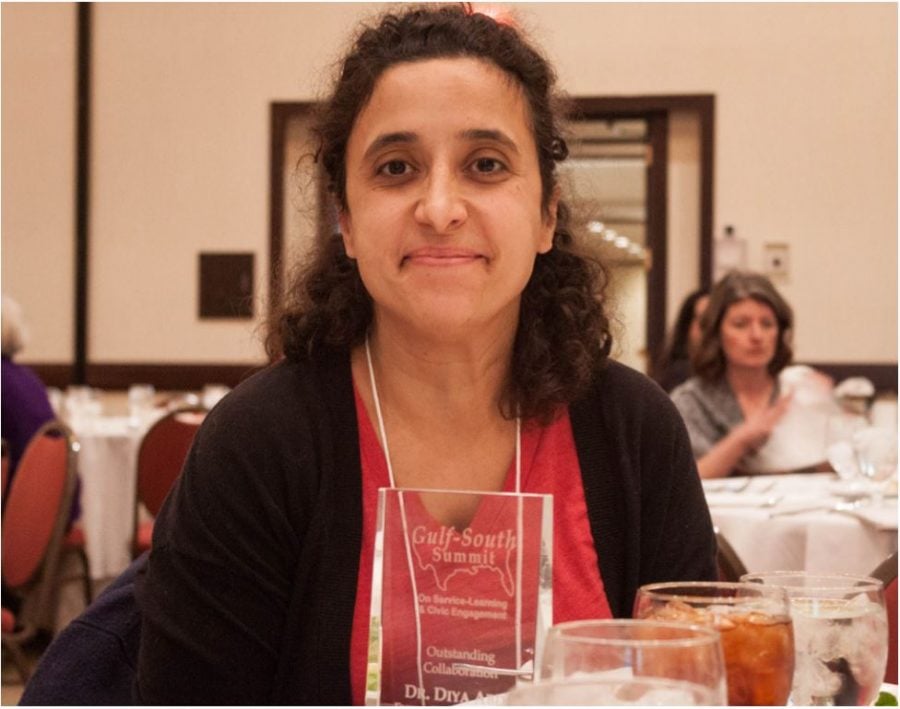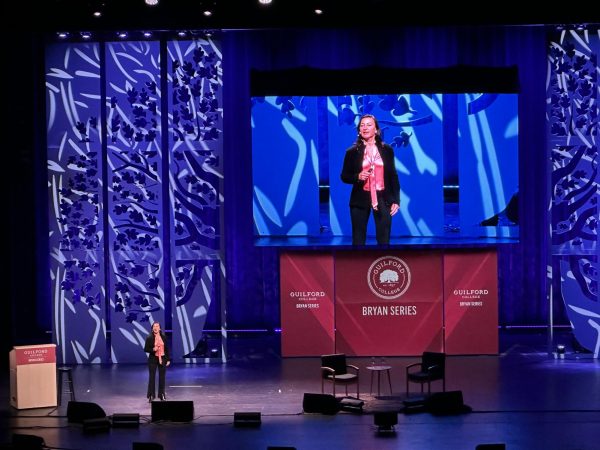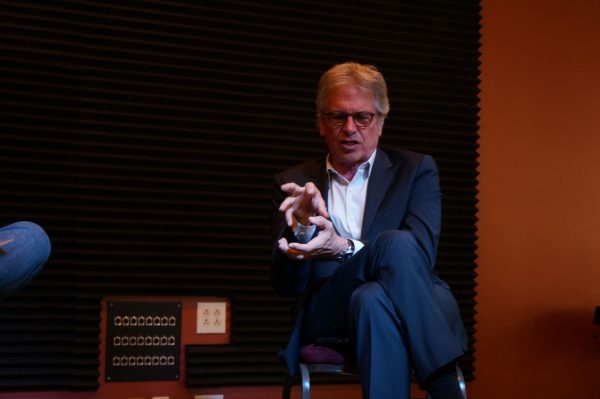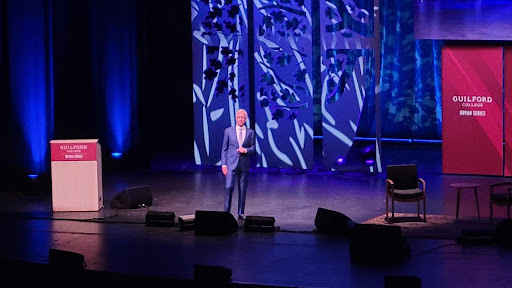Every Campus a Refuge becomes PPS minor
ECAR Minor becomes part of larger plan for refugee resettlement in Greensboro, nationally
Diya Abdo, associate professor of English, receives the 2017 Outstanding Service-Learning Collaboration in Higher Education Award during the Gulf South Summit conference on Friday, March 24, 2017 in Greensboro, North Carolina. // Photo by Fernando Jimenez/Guilfordian.
The acclaimed program Every Campus a Refuge is now a part of Guilford College’s curriculum.
Every Campus a Refuge is a Principled Problem Solving Experince minor, meaning it will be a two-year program for current students interested in learning more about the issues of immigrant displacement. Students will even have the opportunity to directly connect with immigrants and refugees.
As a part of the minor, students will connect directly with Syrian refugees through the online service NaTakallam.
Natakallam is a non-profit organization birthed by a woman who wanted to address the refugee crisis. Language learners are paired with displaced Syrians who are not living in the US. Students connect with the displaced individual over Skype. Conversations are one-on-one outside of class times.
As for the minor requirements as a whole, program director and founder of the Every Campus a Refuge initiative Diya Abdo breaks it down into four parts.
“The way I designed the minor was to focus on four things,” said Abdo. “What, who, how and then do something about it.”
Courses that fall under the ‘what’ piece of the minor, such as PPS 250: Genocide and JPS: Understanding Oppressive Systems, teach about forced displacement and (im)migration.
The ‘who’ piece lets marginalized individuals give their own perspective of their situation and share their individual experience rather than having one voice speak out for an entire population. This includes the courses ENGL 350: Immigrant and Refugee Literature and IDS 421: Border Crossings.
‘How’ asks the question of “How do we engage this crisis?” Courses to help students learn more on how to answer this include PPS 110: Intro to Civic Engagement, JPS 103: Community Problem Solving and JPS 220: Community Building Fundamentals.
Feeding off this is the last piece, the doing. This includes participation in the actual Every Campus a Refuge program, focusing on the place-based educational processes of resettlement and community building.
“It’s going to be hard to create a sequence because the courses are offered at different times over the following two years,” said Abdo. “However, courses on the ‘what’ piece will be included in the fall of next year. The ‘who’ piece permeates the entire minor.”
According to Abdo, students are already intrigued.
“I’ve had several students show interest, which is really wonderful,” said Abdo. “I’m hoping that many of students who are already volunteering for Every Campus a Refuge will sign up for the minor because then they can get credit for helping with the families that we are already hosting.”
This minor is mainly offered for sophomores, juniors, and seniors who can declare as a minor. First-years will not be able to take some of the 300 level courses which will require prerequesites.
“However, first-years will be able to take the Every Campus a Refuge theory and practice course with me, which will be offered in the fall and spring (2017),” said Abdo. “They can still take this course and receive credit for assisting and hosting refugees that we host here.”
The Every Campus a Refuge minor is only a small piece of larger goals that Abdo has for the College, and for campuses across the country.
“My goal is to make this a curricular component of what we do at Guilford, so it’s not an add on,” said Abdo. “It’s not simply something that students volunteer to do, but it’s an organic part of our educational mission.
“I like the idea of having students do service learning and learn about this experience and about refugeeism on the campus itself and see the ways their campus, their home, embodies a solution to a problem.”
Abdo has spoken about the Every Campus a Refuge at conferences with representatives from colleges across the country present, who are also intrigued by the idea of incorporating this type of action-based education.
“My goal is that other campuses adopt that model of educating students of their home space and how the resources they have can be both an educational space and in material ways to help with a crisis like the refugee crisis,” said Abdo.
And although this is currently only a two-year program, Abdo hopes that the College is able to continue the program beyond its current time frame.
“My hope is that we can renew it if it is renewable and that it is something that other campuses will adopt,” said Abdo. “I hope that people sign up for the minor and I think it’s going to be wonderful. I’m excited for the cohort experience of having students come togethtaking courses together, and doing this as a community.”









